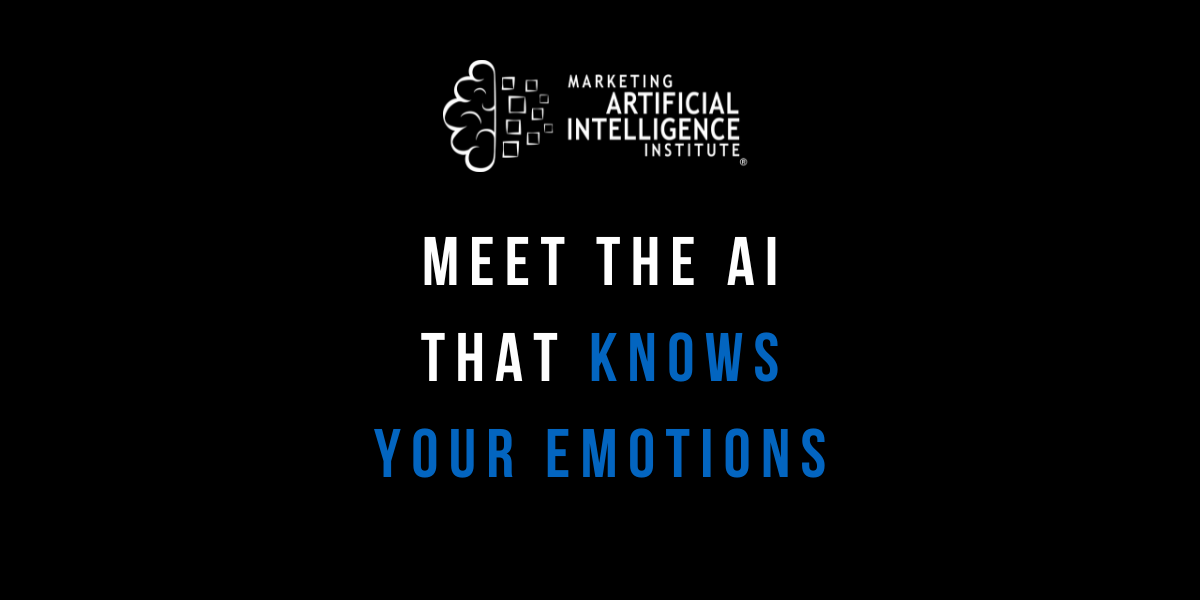We now have AI that can understand your emotions and respond with empathy.
The tech comes from Hume AI, a startup co-founded by a former Google DeepMind researcher.
Hume AI's core product is its Empathetic Voice Interface or EVI. EVI can carry on a conversation with users simply by speaking and responding via voice.
When you talk with EVI, it understands your emotions in real time. EVI does that by understanding your pitch, tone, and facial expression.
This gives EVI several emotionally intelligent capabilities:
- It can respond with different tones based on the tenor of the conversation.
- It can react to your emotions with language that addresses your needs.
- It knows when to start and stop speaking based on cues in your tone of voice.
- And, says the company, it "learns to make you happy by applying your reactions to self-improve over time."
What does technology like this mean for the future of business?
I got the answer from Marketing AI Institute founder/CEO Paul Roetzer on Episode 90 of The Artificial Intelligence Show.
First, we have to take a step back…
Some may find this technology creepy. And it does have that potential. (After all, there are plenty of ways that AI reading your emotions could go wrong.)
But there may be serious benefits here, too.
"It is definitely potentially creepy, but I think we have to take a step back and think about the role of empathy in human communications," says Roetzer.
Many humans lack empathy or struggle to be empathetic. Yet, empathy is critical in communication and relationships. It's possible a person who lacks empathy could use AI to make their interactions more empathetic.
"AI may actually enhance human empathy by synthesizing it for people," says Roetzer.
Empathy like this could make business better
Technology like this could dramatically improve how we do business.
Take HR, for example…
"When you have to communicate bad news from an HR perspective, there's a lot of people that aren't very good at that," says Roetzer.
That goes for customer service, patient communications, and many other sensitive interactions in business.
The ability to run things through an AI empathy layer could seriously improve the level of empathy that everyone brings to the table in these interactions.
"In all of these things, empathy is able to enrich the communications and the relationships that occur."
Expect to see technology like this everywhere
Given the value of empathetic AI, Roetzer predicts you'll see it everywhere—soon.
"I can't imagine a near future where every AI chatbot doesn't have an empathy component to it, both understanding your emotions as you're communicating with it and communicating back to you in an empathetic way," he says.
Imagine your preferred voice assistant communicating back to you based on how you're feeling and acting. Imagine every digital interaction with AI using this technology.
It's not hard to imagine.
Now, take it several steps further:
We're already seeing intelligence being injected into robotics via models from OpenAI. Now, imagine the same being done with empathy.
"I do still feel that empathy is a uniquely human trait. The machine doesn't actually feel anything, but it can synthesize empathy at a superhuman level," says Roetzer.
"And that's a weird thing to wrap our minds around. But that's just something we're going to have to adjust to as a society," says Roetzer.
You don't have to wait to experience the future
This isn't some far-flung sci-fi future. You can try Hume AI right now. Or, just use an AI assistant like ChatGPT to make your communications more empathetic.
Sometime soon, it's reasonable to assume AI tools will start to automatically detect emotion and tone in your communications and offer more empathetic suggestions, says Roetzer.
"This is the positive outlook of what copilots or assistants can be: when they're proactive in helping us be better professionals."
Mike Kaput
Mike Kaput is the Chief Content Officer at SmarterX and a leading voice on the application of AI in business. He is the co-author of Marketing Artificial Intelligence and co-host of The Artificial Intelligence Show podcast.


